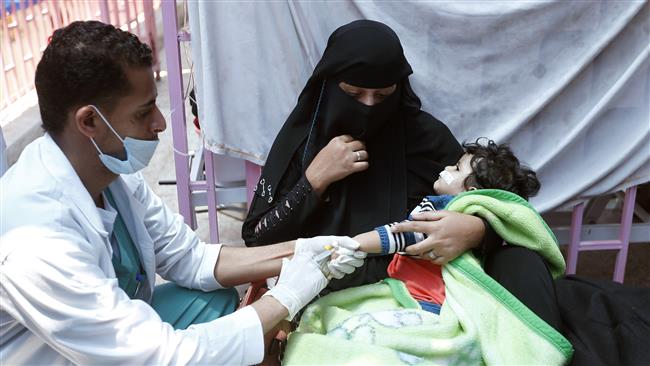
RNA - Secretary of State for International Development Penny Mordaunt said Britain supports the Saudi-led coalition’s right to screen shipments but added there was “no excuse” for blocking checked vessels.
Speaking to the Telegraph she stressed that “It is very clear that if you are using starvation as a weapon you are in breach of international humanitarian law. And what I have seen on my visit is that what is being held up is aid.”
“Unless this gets through we think that about 150,000 children may perish in the next few months. Already about 400,000 are severely malnourished and the death rate is going to increase dramatically if we don’t get food, but also critically fuel, in as well,” she said.
Mordaunt met with Saudi foreign minister Adel al-Jubeir and commander of the Saudi-led coalition forces Prince Fahad bin Turki, as well as other officials, to insist that the coalition clear the way for boats bound for the Yemeni ports of Hudaydah and Saleef.
Britain’s clout over Saudi Arabia has not been greatly tested recently, but the demands from Mordaunt will indicate just how strong ties are.
Last week Mordaunt announced £50 million of additional aid to Yemen in a bid to get food to 3.4 million people.
“I’ve got a good understanding of how it all works, and I will be going to my meetings [on Sunday] to say what I have seen today. Which is that there should be no excuse for not letting cleared ships into Hodeidah,” she told the Telegraph.
“I very much understand the strategic importance of our relationship with Saudi Arabia," she said, adding that "But we do not help that relationship by not speaking about the facts of the matter."
“If there were to be a breach of international humanitarian law, that would put that relationship into difficulty," she underscored.
Mordaunt’s visit came two weeks after UK Prime Miniter Theresa May raised concerns over the Yemen blockade in a meeting with the Crown prince of Saudi Arabia, Mohammed bin Salman.
Saudi Arabia has been striking Yemen since March 2015 to restore power to fugitive president Mansour Hadi, a close ally of Riyadh. The Saudi-led aggression has so far killed at least 15,300 Yemenis, including hundreds of women and children.
Despite Riyadh's claims that it is bombing the positions of the Ansarullah fighters, Saudi bombers are flattening residential areas and civilian infrastructures.
According to several reports, the Saudi-led air campaign against Yemen has driven the impoverished country towards humanitarian disaster, as Saudi Arabia's deadly campaign prevented the patients from travelling abroad for treatment and blocked the entry of medicine into the war-torn country.
The cholera outbreak in Yemen which began in April, has also claimed over 2,200 lives and has infected about one million people, as the nation has been suffering from what the World Health Organization (WHO) describes as the “largest epidemic in the world” amid a non-stop bombing campaign led by Saudi Arabia. Also Riyadh's deadly campaign prevented the patients from traveling abroad for treatment and blocked the entry of medicine into the war-torn country.
According to reports, the cholera epidemic in Yemen, which is the subject of a Saudi Arabian war and total embargo, is the largest recorded in modern history.
Aid officials have also warned of the spread of diphtheria in war-torn Yemen, as WHO and officials with the international medical charity Doctors Without Border, announced that the diphtheria spread is inevitable in Yemen due to low vaccination rates, lack of access to medical care and so many people moving around and coming in contact with those infected.
The United Nations had described the current level of hunger in Yemen as “unprecedented,” emphasizing that 17 million people are now food insecure in the country.
A recent survey showed that almost one third of families have gaps in their diets, and hardly ever consume foods like pulses, vegetables, fruit, dairy products or meat.
More than 3 million pregnant and nursing women and children under 5 need support to prevent or cure malnutrition.
The United Nations has also warned that 8.4 million people in war-torn Yemen are “a step away from famine”, as Saudi Arabia and its allies are ceaselessly pounding the impoverished country.
"The lives of millions of people, including 8.4 million Yemenis who are a step away from famine, hinge on our ability to continue our operations and to provide health, safe water, shelter and nutrition support," Jamie McGoldrick, the UN's humanitarian coordinator for Yemen, said in a statement on Monday.
"The continuing blockade of ports is limiting supplies of fuel, food and medicines, dramatically increasing the number of vulnerable people who need help," he added.
The United Nations had also warned that millions of people will die in Yemen, in what will be the world's worst famine crisis in decades, unless the Saudi-led military coalition ends its devastating blockade and allows aid into the country.
847/940